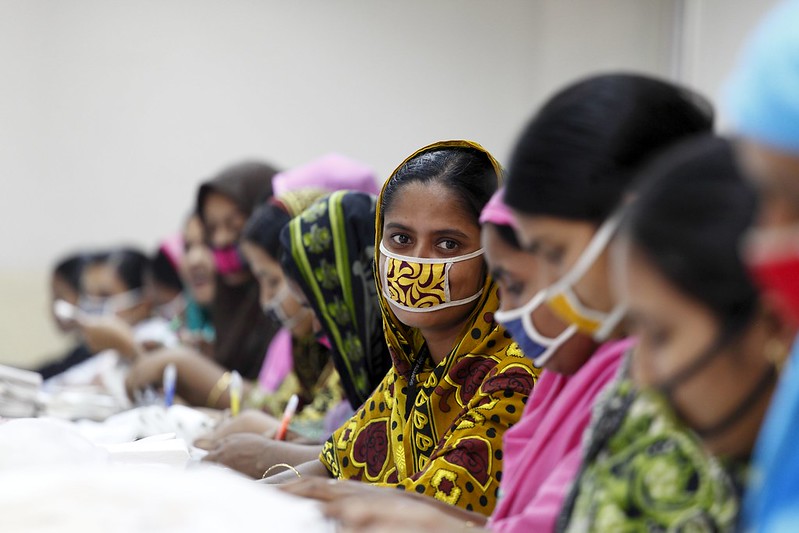10 August, 2022Purchasing practices of global brands are increasing the risk of abuse for workers at the far end of the supply chain in the textile and garment sector.
There are several reports of gross violations of workers’ rights in garment manufacturing units in South Asia where most of the production for global apparel brands takes place. Women, who make up more than 80 per cent of the workforce in the sector, experience sexual harassment at work daily. IndustriALL affiliates in the region have repeatedly highlighted the issue, which has worsened over time as production catered for the fast-changing needs of the sector.
The abuse of women is systemic, where deeply rooted patriarchy plays a vital role in ensuring the control of women on the shopfloor. The abuse by men in authority is manifested in the form of gender-based violence and harassment. The abuse ranges from groping, touching, leaning, hitting, punching, slapping, pulling hair, offensive comments about their body, sexual jokes, obscene gestures, and offensive text messages, among others.
Violence is also used as a tool by management to ensure productivity. Women are constantly mocked — for not working fast enough to meet the production target but also for taking washroom breaks, their attire, menstruation, and pregnancy. A member of an IndustriALL affiliate in India reported that her supervisor threatened her with rape if she failed to complete the work.
Affiliates in Sri Lanka and Bangladesh shared that production managers and supervisors frequently seek sexual relationships with workers promising benefits like pay raises, and reduced workloads. Workers who refuse these offers risk punishment, including being fired, due to the power hierarchy between male supervisors and women workers. Threats of dismissals are also frequently used to ‘discipline’ workers on the shopfloor.
Anton Marcus, general secretary of IndustriALL affiliate Free Trade Zones and General Services Employees Union, says:
“Workers are sexually harassed and abused not only on the shopfloor but also while commuting to work, and in their hostel accommodation. We have seen that compared to their male counterparts, female machine operators are subjected to greater criticism and abuse from their supervisors.”
The stigma associated with reporting sexual harassment and laxity in the implementation of the rule of law deters workers from reporting the abuse. This in turn emboldens perpetrators to continue the harassment. In cases where women report abuse, they are often penalized by management to set a precedent for other workers to toe the line. Either they are retrenched on flimsy charges, or they find themselves in the spiral of continuous abuse where their targets are increased, leave denied, wages deducted on arbitrary charges. Sometimes they are transferred to precarious jobs. As a result, affiliates in the region find it extremely challenging to respond to cases of sexual harassment.
Rampant sexual harassment reported by our affiliates poses a risk not just to the workers experiencing it, but also to brands sourcing from these workplaces. They are ultimately responsible for working conditions in their supply chains and hence need to ensure that the women working are safe at their workplaces.
There are mechanisms now in place such as the RMG Sustainability Council complaint mechanism in Bangladesh and the national monitoring committees set up under the global framework agreement that IndustriALL has with H&M which can deal with issues of sexual harassment, apart from the legal recourse available. The affiliates are educating their membership to use these mechanisms to address sexual harassment. Brands will have to do their part by getting their suppliers to respect and follow these mechanisms.
Apoorva Kaiwar, IndustriALL regional secretary for South Asia says:
“The fight against sexual harassment and gender-based violence is an integral part of the fight for decent work in the supply chains. The responsibility for dealing with this toxicity in the garment supply chain ultimately lies with the big retail brands that profit from the supply chains. Collective action is needed to ensure that brands take responsibility.”
